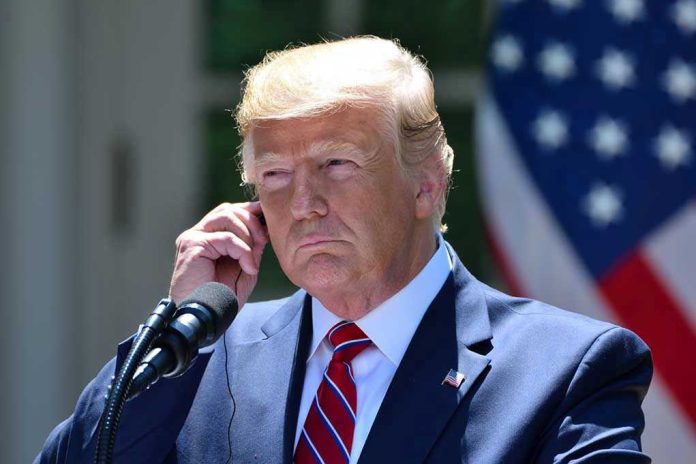
President Trump’s cryptic declaration that he “thinks he knows his choice” for the next Federal Reserve Chair has sent shockwaves through financial markets and ignited a fierce debate about the independence of America’s central bank.
Story Snapshot
- Trump signals he has selected Jerome Powell’s replacement ahead of the May 2026 chair expiration
- Treasury Secretary Scott Bessent reveals shortlist of five finalists including Fed insiders and Wall Street figures
- Stephen Miran’s nomination to the Fed Board represents Trump’s first move to reshape monetary policy direction
- Financial markets experience volatility as investors anticipate a more dovish Federal Reserve under new leadership
The Power Play Behind Closed Doors
Trump’s public statements represent an unprecedented level of presidential pressure on Federal Reserve leadership. His repeated criticisms of Powell, calling him “Mr. Too Late” and “a knucklehead,” signal a fundamental shift in how the administration views the central bank’s role. The president’s dissatisfaction stems from Powell’s cautious approach to interest rate cuts, which Trump believes has hampered economic growth and his broader policy agenda.
President Trump says, "I think I already know my choice," for Jerome Powell's successor as Fed chair. pic.twitter.com/1sxjHP5O8t
— Yahoo Finance (@YahooFinance) November 18, 2025
The nomination of Stephen Miran to fill Adriana Kugler’s vacant board seat reveals Trump’s strategic approach to reshaping Fed policy. Miran, who chairs the Council of Economic Advisers, openly acknowledged during Senate hearings that Trump selected him due to their shared economic philosophy. This transparency breaks from traditional appointments where nominees emphasize their independence from political influence.
The Shortlist That Could Reshape Monetary Policy
Treasury Secretary Scott Bessent’s revealed shortlist of five candidates presents a fascinating mix of Fed veterans and outsiders. Michelle Bowman and Christopher Waller bring institutional knowledge as current board members, while Kevin Warsh offers experience from the 2008 financial crisis era. Kevin Hassett, Trump’s former economic adviser, and BlackRock’s Rick Rieder represent the administration’s preference for market-oriented thinking over traditional central banking orthodoxy.
Each candidate brings distinct policy leanings that could dramatically alter the Fed’s approach to inflation targeting and employment mandates. Hassett and Rieder are viewed as more dovish, favoring aggressive rate cuts to stimulate growth. Conversely, Waller and Warsh have demonstrated hawkish tendencies, prioritizing price stability over short-term economic acceleration. This ideological spectrum reflects the broader tension between political priorities and traditional monetary policy independence.
Market Tremors and Economic Implications
Financial markets have responded with characteristic volatility to Trump’s Fed chair machinations. Cryptocurrency markets, particularly sensitive to liquidity expectations, have experienced significant swings based on speculation about the new chair’s rate-cutting appetite. Traditional equity and bond markets similarly reflect investor uncertainty about future monetary policy direction under Trump’s preferred leadership.
The broader economic implications extend far beyond Wall Street trading floors. A more accommodative Fed could provide relief to borrowers through lower interest rates, potentially boosting housing markets and business investment. However, economists warn that premature rate cuts could reignite inflationary pressures that the current Fed leadership has worked diligently to contain. This tension between short-term growth stimulation and long-term price stability represents the core challenge facing any new Fed chair.
Constitutional Crisis or Necessary Reform
Trump’s aggressive approach to Fed leadership raises fundamental questions about central bank independence that have defined American monetary policy since 1913. Legal scholars note that while presidents possess nomination authority, the Fed’s institutional independence serves as a crucial check against politically motivated economic decisions. Nixon’s pressure on Arthur Burns during the 1970s provides a cautionary tale about the inflationary consequences of subordinating monetary policy to political expediency.
Conservative principles traditionally support institutional independence as a bulwark against government overreach, yet Trump’s approach reflects legitimate concerns about unelected officials wielding enormous economic power. The administration’s emphasis on accountability and responsiveness to elected leadership resonates with voters who question why central bankers should operate beyond democratic influence. This philosophical tension will likely define the confirmation process and shape public debate about the Fed’s proper role in American governance.
Sources:
Trump to Nominate Stephen Miran to Federal Reserve Board of Governors
Who Does Trump Want to Be the Next Fed Chair?
Trump Fed Chair Nomination Central Bank Independence Tensions
Who is Fed nominee Stephen Miran, and why is he so controversial?
Who has to leave the Federal Reserve next?



